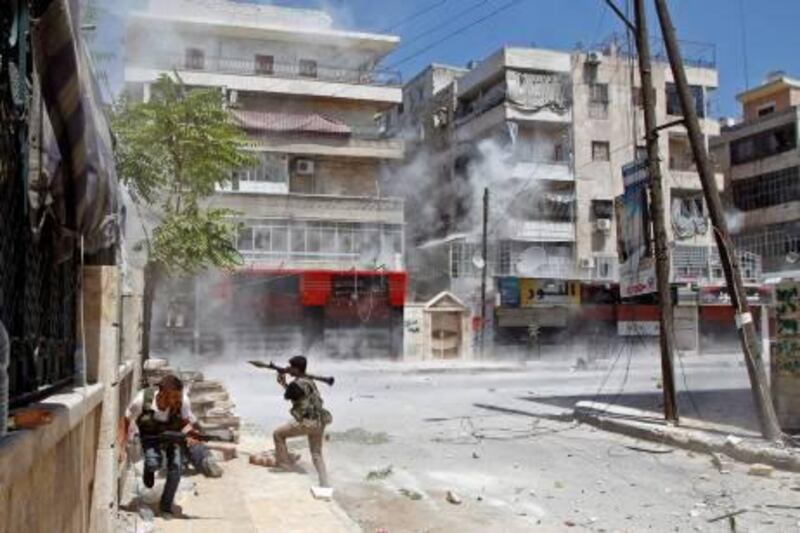ALEPPO //Abu Suleiman's rebel unit has started using unorthodox tactics to help take this strategic city from forces loyal to Syrian President Bashar Al Assad.
Targeted by snipers and indiscriminate bombardments by government warplanes flying overhead, he and his fellow Free Syrian Army (FSA) fighters have learnt to avoid moving through the streets of Aleppo's Salaheddine neighbourhood.
They prefer punching holes through apartment walls, creating networks of indoor passageways to funnel fighters from flat to flat and closer to enemy lines.
This has made for some awkward encounters.
"The other day my commander and I broke through a wall and when we looked through, we saw three soldiers from the Syrian Army on the other side," Abu Suleiman said yesterday, as the sound of helicopter gunships firing echoed in the background.
"He yelled: 'Soldiers, soldiers, soldiers!' But they got away before he could remove the safety on his rifle," said Abu Suleiman, 30, a resident of Aleppo, who did want to use his real name.
Such is the state of urban warfare in Aleppo, which rebel forces largely led by fighters from surrounding village, initiated last month the most coordinated anti-government military campaign since the uprising against Al Assad's regime began 17 months ago.
Human rights activists say the fighting in the war has killed at least 20,000 people.
Rebel commanders say they have captured two-thirds of Aleppo - considered crucial for its massive industrial output, which had been humming along until last month's assault.
A full rebel takeover would be a significant setback for Mr Al Assad's government. That may explain the intensified, and seemingly random, aerial bombardments by helicopters gunships and Russian-made warplanes that has proved deadly for rebel fighters and civilians caught up in the clashes. Government aircraft increasingly target apartment buildings where they know rebel fighters are hiding.
"This shows their true cowardice," said Captain Ahmed Tlass, 28, who led a unit of about 30 men for several days in Salaheddine. "Now they're attacking apartments to completely obliterate them - to the ground."
Still, rebel commanders see this as a sign of their enemy's weakness.
Abdel Qader Saleh, a field commander for the Tawhid Brigade, an umbrella grouping of fighters from Aleppo's countryside, believes momentum is certainly in favour of his 8,000 fighters - even if places such as Salaheddine appear mired in stalemate.
They took three more neighbourhoods on Friday, he said, adding that the bulk of the Aleppo province's countryside had already fallen to the rebels in recent weeks.
"The countryside is ours and, after taking that we came to Aleppo," he said. "And now we have 60 per cent of the city."
Still, he acknowledged setbacks. A lack of access to weapons and ammunition has plagued his forces, he said, in part because of disunity among other rebel fighting groups that operate independently of his Tawhid Brigade. Foreign powers, he added, had also failed to provide the necessary weapons - especially anti-aircraft weapons - for his fighters.
It was a lack of ammunition that led rebels to temporarily withdrew from Salaheddine, which they hope to capture to gain control of the main road to Damascus, the capital, and thereby sever government forces from their supply lines.
The prolonged fighting has also taken its toll on the civilians.
"Really, all we want is peace," said Salem Kamoosh, 24, a resident of Bab Al Nasser, a frontline neighbourhood in the historic Old City where rebel fighters routinely exchange machine-gun and rocket-propelled grenade fire with regime forces.
He was scouring the area for food, water and petrol, all of which are in short supply.
But it is a fight that he acknowledged must go on.
For Abu Suleiman, rebel fighters will stay on fighting, even if the enemy unleashes more random and deadly munitions. It is a risk all rebels are prepared to take, he said.
"We can't see who we're fighting or who we're shooting at, but we're here to stay until we win," he said.
Yesterday in Damascus, gunmen simultaneously detonated two roadside bombs and clashed with police, causing panic but no injuries or damage.
On the capital's edge, Syrian forces pounded a suburb with mortars and artillery shells, a day after rebels operating in the town abducted a pro-government TV crew, activists said. It was the latest attack on pro-regime media and the latest abduction blamed on rebels in the civil war.
One of the blasts went off in central Damascus' Marjeh district, when an explosive device planted under a tree was detonated by remote control as a vehicle carrying soldiers passed by, an official at the site of the blast told the Associated Press. The explosion, which caused no casualties, went off about 100 metres from the Four Seasons, one of the luxury hotels in Damascus.





